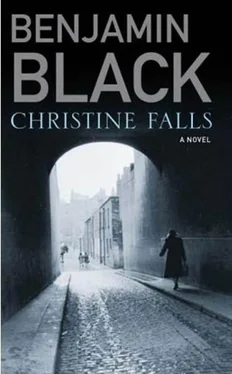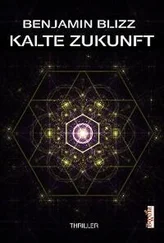She decided she would go to Moran’s and treat herself to a gin and water, just the one. She had three, however, in quick succession, and then another, more leisurely, and then a last one, for the road. As she walked home through the smoky dusk she began to feel a doubt: had she been too hasty in posting the envelope? Maybe those two were not who she thought they were, and even if they were, maybe it was not her they were watching. There were always things going on around here, thieving, and fights, and men found lying in the street with their teeth kicked in. If it was all no more than her imagination, Jesus, what had she done? Should she return to the post office and see if she could get back the envelope? But the place would be shut and the scowling clerk long gone, and anyway the post had probably been collected from the box by now. She belched, and a fiery tang of gin flooded the back of her throat. So what, anyway, if the thing was delivered? Let them suffer a bit, she thought, let them see what life is like down here.
Because of the gin she had drunk she had to search with the key for the keyhole. In the hall she felt a draft from the back of the house but took no notice. Even when she heard the wireless playing softly in the kitchen-the Ink Spots crooning “It’s a Sin to Tell a Lie”-she supposed it must have been on when she went out and in her hurry she had forgotten to turn it off. She hung up her coat and went into the living room. Here, too, the air had an unaccustomed chill; she must think of getting an electric fire put in before the winter, one of those ones with the red light in them that looked like logs burning. She was on her knees on the hearth, stacking up kindling in the grate and wondering where she could have put those matches, when she heard them behind her. When she looked over her shoulder they were standing in the kitchen doorway. Everything slowed down suddenly, as if a huge engine that she was inside of had switched into its lowest gear. She was struck by the things she noticed-that the fat one’s hair was a coarse, rusty color in the electric light and that his shapeless sweater was hand-knitted, and that the one with the hooked nose was redder than ever in the face and that the cigarette he was holding between a tobacco-stained finger and thumb was a roll-up. She saw too, perfectly clearly, what she knew she could not be seeing, the smashed pane of glass in the corner of the back door just above the latch, and felt the cold black night air pouring in through the hole. And why had they turned on the wireless? For some reason that was the most frightening thing, the wireless playing, those black fellows singing in their falsetto voices. “Evening, Dolly,” the hooked-nosed one said affably, and she felt what was at first no more than a tickling sensation between her thighs, but then the sudden, scalding gush of liquid ran down the insides of her legs and spread its dark stain around her on the rug where she was kneeling.
THE TAXI WAS AN ANCIENT FORD THAT WHEEZED AND SHUDDERED. The ill-lit, smoky streets were silent. Quirke should have been used to this kind of thing, the late-night summons, the journey through the darkness, then the ambulance at the curb, the slewed police cars, and the lighted doorway where large, vague men loomed. One of them, in a long raincoat and a slouch hat, stepped forward to greet him. “Mr. Quirke!” he said, sounding pleased and surprised. “Is it yourself?”
Hackett. Inspector. Big, broad-shouldered, slow, with a merrily watchful eye. It was he who had telephoned.
“Inspector,” Quirke said, shaking a hand the size of a shovel. “Is Miss Moran here?” he asked, flinching inwardly at the fatuous sound of it.
Hackett fairly twinkled. “Dolly?” he said. “Oh, she is, she is.”
He led the way into the hall, squeezing past two boffins from forensics dusting for prints. Quirke knew them, but could not remember their names; they nodded to him, with that expression forensics always had, po-faced and blank, as if they were covering up a private joke. The living room was a chaos of overturned chairs, spilt drawers, a disemboweled sofa, papers torn and strewn. A guard in uniform and cap, young, with acne and a prominent, triangular adam’s apple, was positioned by the kitchen doorway; he was a little green in the face. Beyond him there was more disorder, indecent in the glow of a single, bare bulb. The smell was so familiar Quirke barely registered it.
“There she is,” Hackett said, adding with a gleam of irony, “your Miss Moran.”
She had been tied to a kitchen chair, bound at the ankles with her own stockings and at the wrists with lengths of electric wire. The chair had overturned and she lay on the floor on her right side. She had worked one arm free of its bonds. Quirke was struck by the pose, the flexed knees and upflung arm: another mannequin.
“You called me at home,” Quirke said, still bending over the corpse with his hands on his knees. “Did the hospital give you my number?”
Hackett showed the piece of white pasteboard, clipped by its four corners in the hollow of his palm like a conjuror’s playing card.
“It seems,” he said easily, “you left your calling card, on some previous social visit.”
A YOUNG NUN WITH PROMINENT TEETH OPENED THE DOOR AND STOOD aside and motioned her to enter. At the sight of the long, gaunt room something inside her shrank back, and for a moment she was a child again, quaking on the threshold of Mother Superior’s office. Massive mahogany table, six high-backed chairs that no one had ever sat on, glass-fronted bookcases, a coatless coat rack; in a wall niche a three-quarters-life-sized statue of the Virgin stood disconsolate in pale blue and white, holding between two fingertips and a thumb, in an attitude of dainty misgiving, a large white lily, sign of her purity. At the other end, under a muddy picture of some sainted martyr, there was an antique desk with lamp and leather-bound blotter and two telephones-why two? Somehow, without her noticing, the young nun had left, shutting the door behind her without a sound. She stood in the midst of silence, the child in her arms asleep in its blanket. The trees outside the windows were unfamiliar, or did they only seem so? Everything here seemed strange to her, still.
Another door, one that she had not noticed, flew open as if a wind were behind it. What entered was a tall nun, high-shouldered as a man, with a narrow, stark, pale face. She came forward quickly, both hands held out, her heavy black habit audibly displacing air, her face smiling and seeming at the same time surprised at itself, as if smiles were strangers to it. This was Sister Stephanus.
“Miss Ruttledge,” she said, taking Brenda’s free hand in both of hers, “welcome to Boston, and St. Mary’s.”
She had the usual nun’s musty smell. Brenda could not stop herself recalling the stories that were told at the convent when she was a girl about the sisters being forbidden ever to be naked and having to wear a special sort of swimming costume in the bath.
“I’m very glad to be here, Sister,” she said, in a voice that annoyed her by its seeming meekness. She was no longer a child, she told herself, and this nun had no authority over her. She drew up her shoulders and stared back stoutly into the woman’s coldly beaming face. “Boston is very nice,” she added. That, too, sounded weak and silly. The baby kicked her in the side through its blanket, as if demanding to be introduced; quite the little miss already. The nun’s brittle smile slid downwards.
“And this must be the baby,” she said.
“Yes,” Brenda said, and held aside the rim of the blanket with her finger to show the tiny, livid face with its rosebud mouth and permanently startled blue eyes. “This is little Christine.”
Читать дальше












